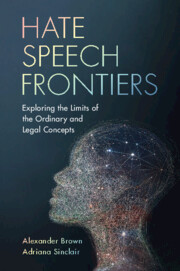Book contents
- Hate Speech Frontiers
- Hate Speech Frontiers
- Copyright page
- Dedication
- Contents
- Acknowledgements
- 1 Conceptual Frontiers in the Understanding of Hate Speech
- Part I The Ordinary Concept
- 2 Prototypical Examples of Hate Speech
- 3 Attacks against Groups
- 4 Attacks on the Identities of Groups
- Part II The Legal Concept
- Notes
- Index
4 - Attacks on the Identities of Groups
from Part I - The Ordinary Concept
Published online by Cambridge University Press: 26 October 2023
- Hate Speech Frontiers
- Hate Speech Frontiers
- Copyright page
- Dedication
- Contents
- Acknowledgements
- 1 Conceptual Frontiers in the Understanding of Hate Speech
- Part I The Ordinary Concept
- 2 Prototypical Examples of Hate Speech
- 3 Attacks against Groups
- 4 Attacks on the Identities of Groups
- Part II The Legal Concept
- Notes
- Index
Summary
Chapter 4 defends classifying a further five grey area examples as hate speech in the ordinary sense of the term under the global resemblance test. We shall also critically examine Facebook’s community standard on hate speech in relation to its handling of these kinds of attacks, and make specific recommendations to address relevant weaknesses. Section 4.2 looks at what we call identity attacks. Section 4.3 investigates existential denials, namely statements denying the very existence of people identified by a protected characteristic. Section 4.4 scrutinises identity denials, by which we mean statements denying that certain people are who they take themselves to be, based on protected characteristics. Section 4.5 examines identity miscategorisations, which go one step further and attribute identities to people that do not match the identities they take themselves to possess, based on protected characteristics. Finally, Section 4.6 assesses identity appropriations, wherein people adopt elements of the identities of other people, based on protected characteristics, but without claiming to possess the relevant identities.
- Type
- Chapter
- Information
- Hate Speech FrontiersExploring the Limits of the Ordinary and Legal Concepts, pp. 209 - 326Publisher: Cambridge University PressPrint publication year: 2023

